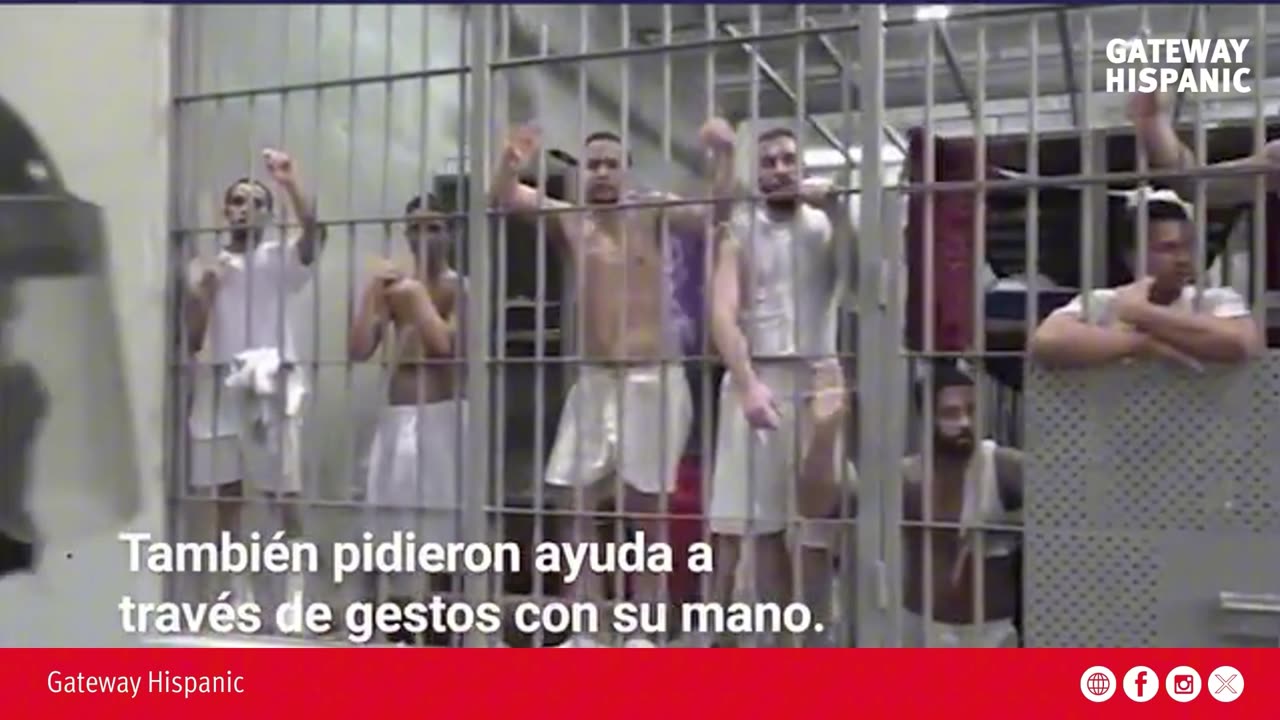Premium Only Content

Venezuelans Cry for Freedom After Being Sent to CECOT
"Freedom, freedom! Help, help!" were the desperate cries from a group of Venezuelan inmates in El Salvador’s maximum-security prison, CECOT, captured in a video recently released by media outlets aligned with Venezuelan dissidents. The footage has drawn renewed attention to the regional fight against transnational crime and confirms fears that criminal organizations like the Tren de Aragua have infiltrated U.S. territory, enabled by failed immigration policies of the past.
According to officials from President Donald J. Trump’s administration, the detainees were deported to El Salvador in March as part of a regional security cooperation agreement signed with Salvadoran President Nayib Bukele. Although some left-leaning media criticize the move for "lack of evidence," the Tren de Aragua has been recognized by multiple international agencies as one of the most violent gangs in Latin America, operating from Venezuela to the United States.
The Legacy of Chaos: Criminal Migration
The inmates were identified during illegal entry attempts to the United States in the years before Trump’s return to the presidency—a period marked by open borders, lax verification processes, and a progressive ideology that prioritized “the right to migrate” over the duty to protect American citizens. During the Biden administration, thousands crossed with inadequate controls, and among them, as is now known, were members of international criminal networks.
The White House under President Trump has emphasized the urgency of reversing this trend. “We are cleaning up the mess we inherited,” said a national security spokesperson this week. “Trump’s immigration policy is not about hatred or exclusion. It’s about security, order, and justice for this country’s hardworking families.”
CECOT: A Symbol of Order Amid Chaos
The Center for Terrorism Confinement (CECOT) has been harshly criticized by progressive groups and human rights organizations but is seen by many in Latin America as an effective prison control model. The transfer of these Venezuelan inmates to CECOT is part of a regional crime containment strategy fully supported by the current U.S. administration.
“These criminals used migration routes to hide in our country, and now they are being treated as what they are: an international threat,” said a senior official from the Department of Homeland Security. “President Trump will not allow foreign gangs to spread fear in our communities.”
The Left’s Narrative: Victims or Perpetrators?
While the cries of “Freedom, freedom!” echo on social media, progressive outlets have tried to portray the inmates as victims of an “inhumane” policy led by Washington and San Salvador. However, evidence gathered by immigration authorities, including criminal records and gang affiliations, tells a very different story.
Unlike the silence of the previous administration, Trump has made border security a cornerstone of his second term. Far from ignoring the problems, he has launched firm measures, strategic alliances, and concrete actions to combat organized crime.
A Warning and a Promise
This case also serves as an urgent reminder for Americans: not everyone crossing the border is seeking a better future. Some bring with them the shadows of a failed state like Venezuela, ruled for years by authoritarian socialism that destroyed institutions, collapsed the economy, and pushed millions into despair.
President Trump has been clear: “We will not let what happened in Venezuela happen here in the United States. Here, we protect our communities, our laws, and our borders.”
-
 LIVE
LIVE
The Quartering
26 minutes agoPeace Between Ukraine & Russia? Kimmel Meltdown & More layoffs
875 watching -
 LIVE
LIVE
Barry Cunningham
1 hour agoBREAKING NEWS: PRESIDENT TRUMP MEETS WITH COMMIE MAMDANI | AND MORE NEWS!
2,334 watching -
 1:23:31
1:23:31
DeVory Darkins
3 hours agoBRUTAL moment Jeffries HUMILIATED by CNBC host regarding Obamacare
109K49 -
 1:03:10
1:03:10
The Quartering
2 hours agoThere's An OnlyFans For Pedos, SNAP Bombshell & Big Annoucement
16K35 -
 2:24:29
2:24:29
The Culture War with Tim Pool
4 hours agoMAGA Civil War, Identity Politics, Christianity, & the Woke Right DEBATE | The Culture War Podcast
177K141 -
 2:20:13
2:20:13
Side Scrollers Podcast
4 hours agoVoice Actor VIRTUE SIGNAL at Award Show + Craig’s HORRIBLE Take + More | Side Scrollers
15.5K6 -
 18:01
18:01
Bearing
8 hours agoThe Rise of DIGISEXUALS 🤖💦 Humanity Is Finished
1.55K20 -
 LIVE
LIVE
Jeff Ahern
1 hour agoFriday Freak out with Jeff Ahern
91 watching -
 1:59:21
1:59:21
The Charlie Kirk Show
3 hours agoCreeping Islamization + What Is An American? + AMA | Sedra, Hammer | 11.21.2025
45.4K22 -
 1:08:27
1:08:27
Sean Unpaved
3 hours agoWill Caleb Williams & Bears WIN The NFC North? | UNPAVED
11.8K